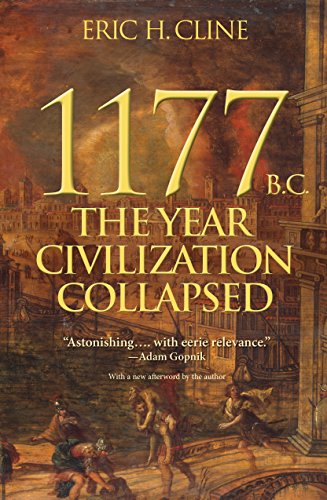Some deliveries may take a little longer than usual due to regional shipping conditions.
Customer Services
Copyright © 2025 Desertcart Holdings Limited




1177 B.C.: The Year Civilization Collapsed
| Best Sellers Rank | #40,013 in Books ( See Top 100 in Books ) #20 in Archaeology (Books) #60 in History of Civilization & Culture #152 in Ancient Civilizations |
| Customer Reviews | 4.2 4.2 out of 5 stars (2,822) |
| Dimensions | 5.5 x 0.5 x 8.5 inches |
| Edition | Revised |
| ISBN-10 | 0691168385 |
| ISBN-13 | 978-0691168388 |
| Item Weight | 8 ounces |
| Language | English |
| Print length | 264 pages |
| Publication date | September 22, 2015 |
| Publisher | Princeton University Press |
F**.
Disappointing
The book is titled "1177 BC The Year Civilization Collapsed", and yet less than half of it deals with the Bronze Age Collapse itself. The author ploughs on for over one hundred pages about how globalized civilization was in 1200 BCE, how rulers addressed each other in official correspondence, or which Pharaoh's cartouche was found under which pile of rubble, and when he finally gets to the point, we are presented with a list of theories for the explanation of the collapse, and a list of reasons why he thinks they are all wrong, with the implicit admission that we still don't really know what happened, and the conclusion being that the collapse was likely due to multiple factors rather than a single one (you don't say!).I cannot imagine what the target for this book might be. It is too casual for an academic audience, yet far too pedantic to be mainstream, and it presents no new theories or evidence. This book may hold some value for one who wants to learn something (but not much) about life towards the end of the Bronze Age in the Eastern Mediterranean area, but the reader looking for insights into the actual Bronze Age Collapse should probably look elsewhere.
G**G
I read and enjoyed this book
I read and enjoyed this book. Its description of interacting (co-dependent?) Bronze Age polities is valuable.However, amid discussions of everything from natural disaster to endemic warfare as an explanation for widespread late BA 'collapse' beyond elite gift-exchange there is little or no discussion of the economic system(s) in play at the time.Given that the seemingly long-established old Assyrian trade networks, which involved a merchant class using contracts and some form of banking had been in use in the MBA some 700 years before the time in question this is quite a serious omission.Secondly, Cline's discussion supposes the longer (traditional) chronology for the Kingdoms of Israel, which more-or-less coincides with late BA collapse (c.1200BC). However, I think several other eminent archaeologists (Finkelstein et al) would still argue for an Iron Age date (c.600BC) for an archaeologically identifiable presence for specifically Jewish religious practice, monumentally etc., that is on return from Babylonian exile.Still a useful read though...
D**.
Great book, one of my favourites
I love good ancient history books but most is written about classical Rome or Greece. 1177 is different. Very different and therefore refreshing. It deals with an earlier age of which not much is known. It’s really nice how it manages to tie together several Mediterranean concepts and cultures which includes quite a few that were fairly unknown to me, like the Hittites and the Cypriot peoples. And its really interesting to see how much evidence there is for all these cultures being interconnected.The book is well-written and never bored me. Plan to read it again at some stage as its so fascinating.
F**N
Hittites and Homer, Philistines and Pharoahs parade through the collapse of the Bronze Age
Can we tell what happened three millennia ago? Eric Cline gives a well-argued case for how the bronze age ended. There is some speculation in Cline's argument - how could there not be? - but within the limits of our knowledge, this book is both interesting and persuasive. And it's a great read that will have you googling all sorts of references.
S**S
A popularized academic book written in a fluent manner. ...
A popularized academic book written in a fluent manner. It has kept my interest ongoing throughout. I agree with most of the critics that, had it been written by Hemingway or Dostojefski, it would have been a masterpiece but these people were not academics...
Trustpilot
1 day ago
2 weeks ago